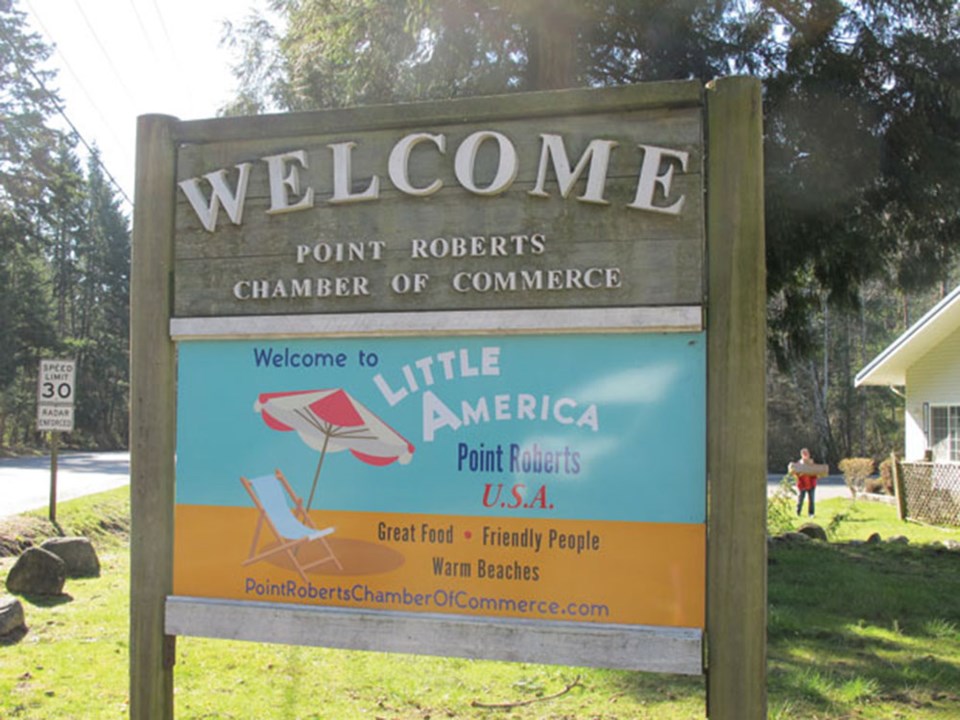The COVID-19 counter measures slapped on to the Point Roberts border crossing during the pandemic are now over, however, the spokesman for business in the tiny U.S. community next to Tsawwassen says the effects will linger long after.
Brian Calder, president of the Point Roberts Chamber of Commerce, said the number of boats in the marina has dropped from 850 in pre-COVID times, to a current total of 500, with most now moored only on a monthly basis.
“The lengthy border lockdown has changed people’s patterns and habits regarding Point Roberts and I do not know if we will ever get it back. Our summer season economic boom has fizzled, yet again,” Calder said.
He said the community has to prepare for the next time something similar happens and borders are closed on tiny U.S. communities with road connections only through the Canadian border.
Point Roberts along with Stewart, B.C., Campbell Is., N.B., and the North West Angle in Minnesota, “suffered unprecedented losses.”
“We simply cannot survive another shutdown,” said Calder.
Those communities faced limited access to care for the sick, elderly and disabled while cross-border schooling stopped and employment, food security and transportation suffered from border closures, he said.
Safety has to remain a top priority during a pandemic, but that must also ensure people have access to the basic necessities of life, he added.
To prepare for next time, Canadian and U.S. agencies should do a post-mortem of the pandemic response for those areas, he suggests adding that U.S. federal, state and local officials are not familiar with the issues facing Point Roberts.
“We must learn from past mistakes and be prepared for future events,” Calder said.
He has previously criticized border restrictions, calling them unnecessary and damaging to the local economy.
Calder said the restrictions aimed at combating COVID-19 have led to a loss of public respect, anger and distrust towards CBSA border guards.
On Monday, Sept. 26, the Public Health Agency of Canada confirmed that all COVID-19-related border measures have been cancelled, effective Oct. 1.
That means travellers, regardless of citizenship, no longer will have to provide proof of vaccination against COVID-19, nor will they have to meet testing, quarantine or isolation requirements.
Masks, though strongly recommended on air and rail travel, are no longer mandatory. And people no longer have to input their health vaccine records into ArriveCan.
Calder said that Point Roberts is going through a transformation because of the pandemic. He said that Canadian families who own about three-quarters of the properties in Point Roberts are selling.
“The children are not following the family tradition of Point Roberts being the default summer holiday destination,” he said.
Meanwhile, Americans are buying homes, then reselling them, after realizing the outpost’s isolation. As well, when Americans settle in Point Roberts, their families are often from far away, meaning there’s less chance relatives will visit Point Roberts.
He noted that border crossings are still down by about 50 per cent when July 2022 numbers are compared with July 2019.
According to the public health agency, the removal of border measures has been facilitated by a number of factors, including modelling that indicates that Canada has largely passed the peak of the Omicron BA.4 and BA.5 fuelled wave. Canada’s high vaccination rates, lower hospitalization and death rates, as well as the availability and use of vaccine boosters (including new bivalent formulation), rapid tests, and treatments for COVID-19 are also cited as reasons.
Cruise ship measures are also being lifted, and travellers no longer will be required to have pre-board tests, be vaccinated, or use ArriveCAN. Guidelines will remain to protect passengers and crew, which will align with the approach used in the United States.
“Thanks largely to Canadians who have rolled up their sleeves to get vaccinated, we have reached the point where we can safely lift the sanitary measures at the border. However, we expect COVID19 and other respiratory viruses will continue to circulate over the cold months, so I encourage everyone to stay up-to-date with their COVID-19 vaccination, including booster doses and exercise individual public health measures. I also thank the dedicated public health officers and frontline staff at our land borders and airports who have worked tirelessly to protect the health and safety of people in Canada for the last two years,” said Health Minister Jean-Yves Duclos.
Canada closed its borders to all but essential crossings on March 21, 2020. That led to a 92-per-cent drop in crossings the next month, according to Statistics Canada. The border reopened in August 2021 to fully vaccinated residents and U.S. citizens.



